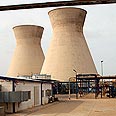
Gas bonanza ushers golden era for refiners
Natural gas flow from Israel's new giant offshore field giving country's two refineries new lease of life, as they no longer require more expensive fuel oil to power their energy-intensive facilities
Gas from the Tamar field off its Mediterranean coast reached Israel for the first time on March 30 and the refineries several days later.
Once energy poor, the new field is set to meet Israel's gas needs for decades, and eventually turn it into an exporter.
"The Israeli gas is much cheaper, much more accessible and in enormous quantities," Rony Solonicof, chief economist at the Bazan Group, which runs one of Israel's refineries, told Reuters.
This abundant and secure source of natural gas ends years of supply concerns following constant disruptions from Egypt, Israel's previous intermittent supplier and declining output from the Yam Tethis offshore field.
"The Tamar start-up represents a considerable relief for Israeli energy security and, with a time-lag, costs, after the country saw successive increases in the cost of energy use as a result of the sporadic nature of Egyptian gas imports from February 2011 (and the ultimate cancellation of that deal)," Catherine Hunt, analyst at IHS, said.
The gas bonanza will boost the tight economics of the Bazan Oil Refineries in the northern city of Haifa and the Paz refinery in Ashdod, south of Tel Aviv as they no longer require the more expensive fuel oil to power their energy-intensive facilities.
Israel refineries first started using natural gas in 2005. In the case of Bazan, the switch back to natural gas is set to shave 2% off total costs. For Paz, it will reduce costs by an estimated 1.5%.
The gas field, located 90 kilometers (56 miles) off Israel's northern coast, has an estimated 10 trillion cubic feet of gas. It is guarded by the Israeli army and though facing potential security risks, is seen as a safe and reliable source of energy.
Egypt suspended gas supplies to Israel last April following a string of attacks on the pipeline in the Sinai peninsula, depriving Israel of 40 percent of its natural gas supplies.
At the same time, supplies from Israel's Yam Tethis natural gas offshore field have gradually depleted in recent years, further tightening supplies and forcing power plants and refiners to power their facilities with more expensive and polluting heavy gasoil.
Cheap, reliable gas
Natural gas from the Tamar field costs around $6 per million British thermal units (mmbtu), around half the cost of gasoil, according to Solonicof.
That compares to average gas prices of $4 per mmbtu in the United States, which has seen its prices tumble thanks to shale gas, and $12 per mmbtu in Europe and over $15 per mmbtu in Asia.
Bazan expects the switch to full gas operation to reduce its costs by $200 million a year out of total expenses which reached $9.7 billion in 2012.
"The financial benefit is even bigger when you know that the (Tamar) gas is much cleaner which extends the life span of the refining equipment," Solonicof added.
The 197,000 barrels per day (bpd) Bazan refinery exports around a quarter of its output to eastern Mediterranean countries. In January, it started a 25,000 bpd cracker, which turns feedstocks into refined products, at an investment of $517 million. The company reported a $46 million net loss in 2012.
For Paz, Israel's largest distributor of refined products, the gradual switch to natural gas will cut costs for its 95,000 bpd Ashdod refinery by more than $50 million per year, according to trade sources.
Paz reported a loss of NIS 166 million ($45 million) in 2012 in its refining segment due to extended maintenance delays.
Total refining costs for the year reached NIS 13.8 billion ($3.8 billion). In April 2012, Paz signed a 15-year supply agreement with the operators of the Tamar field which the company estimated to be worth a total of $700 million.
According to a Paz spokeswoman, gas supply disruptions in 2012 cost the company around NIS 150 million ($41 million), "partly because of the need to replace the gas with more expensive alternatives" such as diesel and fuel oil.










